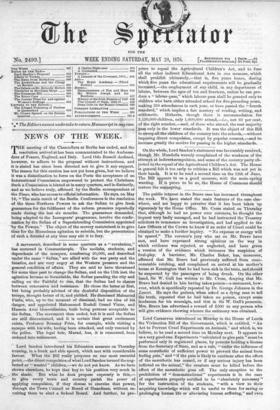Lord Sandon introduced his Education measure on Thursday evening, in
a frank and able speech, which met with considerable favour. What the Bill really proposes on one most essential point,—the direct compulsion of what Lord Sandon termed the neg- lected- or " wastrel " children,—we do not yet know. As we have shown elsewhere, he kept that key to his position very much in the shade. But what he does propose expressly is this,— to give every town and country parish the power of applying compulsion, if they choose to exercise that power, through the Town Council or Board of Guardians, without re- quiring them to elect a School Board. And further, he pro- poses to repeal the Agricultural Children's Act, and to fuse all the other indirect Educational Acts in one measure, which shall prohibit ultimately,—that is, five years hence, during which five years the educational requirements will be gradually increased, —the employment of any child, in any department of labour, between the ages of ten and fourteen, unless he can pro- duce a "labour-pass," which labour-pass shall be granted only to children who have either attended school for five preceding years, making 250 attendances in each year, or have passed the "fourth standard," which implies a fair mastery of reading, writing, and arithmetic. hitherto, though there is accommodation for 3,150,000 children, only 1,800,000 attend,—i.e., not 60 per cent. of the right number,—and, of those who attend, the vast majority pass only in the lower standards. It was the object of this Bill to sweep all the children of the country into the schools,—without imposing direct compulsion, except by popular consent,—and to increase greatly the motive for passing in the higher ,standards.






























